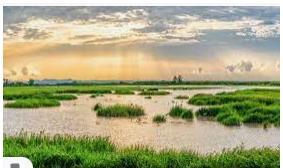Match each term with its definition.Match Term Definition Bogs A) Wet, muddy wetland with very soft ground and varying salinity Delta B) A wetland at the mouth of a river with varying water levels and salinity Estuary C) A triangular track of sediment deposited at the mouth of a river Swamp D) A forested wetland with varying salinity
Answers 2
Matching each term with the most appropriate definition, we have;
A) Bogs: Wet, muddy wetland with very soft ground and varying salinity .
B) Estuary: A wetland at the mouth of a river with varying water levels and salinity .
C) Delta: A triangular track of sediment deposited at the mouth of a river.
D) Swamp: A forested wetland with varying salinity.
A wetland can be defined as an area of very wet, muddy land covered (saturated) by water with wild plants growing on it. Thus, a wetland is an aquatic ecosystem that is saturated with water such as groundwater.
Basically, the characteristics of a wetland are determined by the following factors:
I. Salinity of the water.
II. The animals and plants living in the wetland.
III. Soil type.
Furthermore, there are different types of wetland and these include:
- Bogs: these are very wet, spongy, muddy wetland that are having very soft ground and varying salinity . Also, a bog is characterized by poorly drained peaty soil.
- Swamp: this is a forested wetland that is permanently saturated with water and has varying level of salinity.
- Estuary: it is a wetland formed at the mouth of a freshwater river with varying water levels and salinity.
- Delta: a triangular track of stream-borne sediments deposited at the mouth of a river.

-
Author:
reuben
-
Rate an answer:
9
AI generated Answer
-
Rate an answer:
0
Do you know an answer? Add it here!
Unable to find an answer to your question?
Don't worry! There are several alternative approaches you can try to resolve your query. Here are some tips to help you find answers in different ways:
- Reframe your question: Sometimes, the way you phrase your question can limit your search results. Try rephrasing it using different keywords or providing more context to get better results.
- Utilize social media: Post your question on social media platforms, particularly those focused on professional or specialized topics. Twitter, LinkedIn, and Facebook groups can connect you with individuals who may have relevant expertise or experiences to share.
- Consult subject matter experts: Reach out to experts in the field related to your question. Many professionals are willing to help and share their knowledge. You can connect with them through email, LinkedIn messages, or by attending relevant conferences or events.
- Use our website to find your question through the search box above, or you can sign up to ask your question for our big educational community. Our experts will review your question, and you will get a quick and quality answer.
- Collaborate with others: If your question is related to a specific project or problem, consider collaborating with others who might have complementary skills or knowledge. Teamwork can lead to innovative solutions and shared insights.
Remember, the process of finding answers often involves persistence, creativity, and an open mind. By exploring various resources, reaching out to others, and being proactive in your search, you increase your chances of finding the information you need. Happy quest for knowledge!
